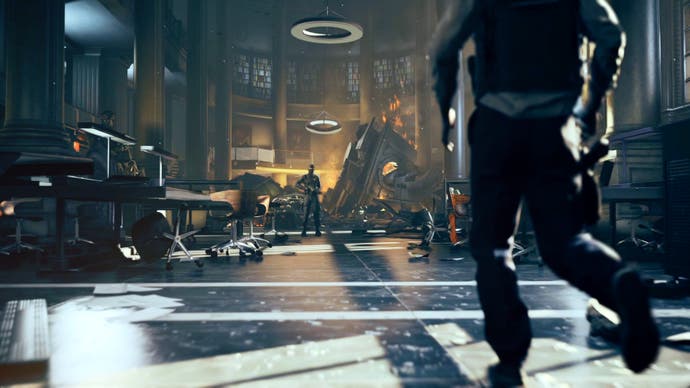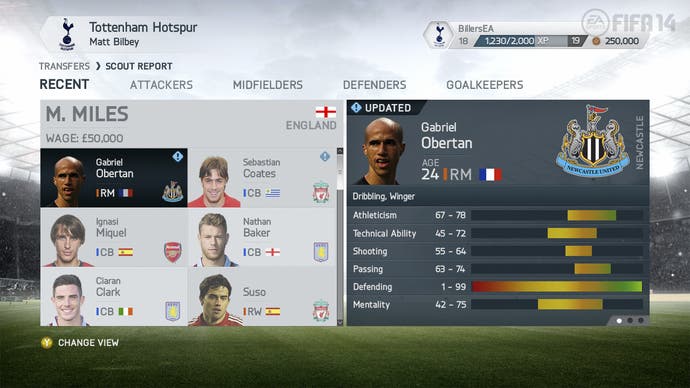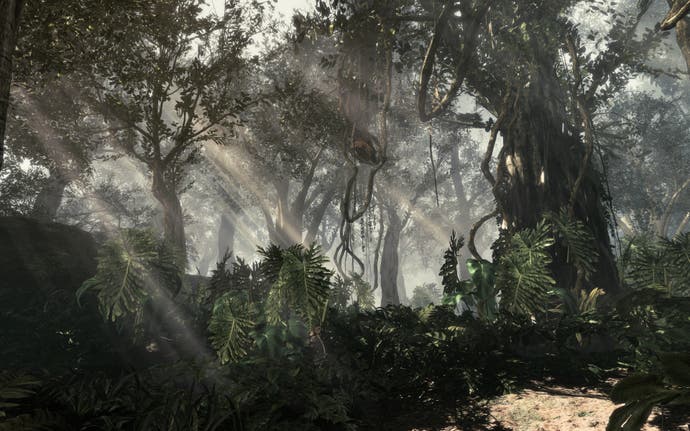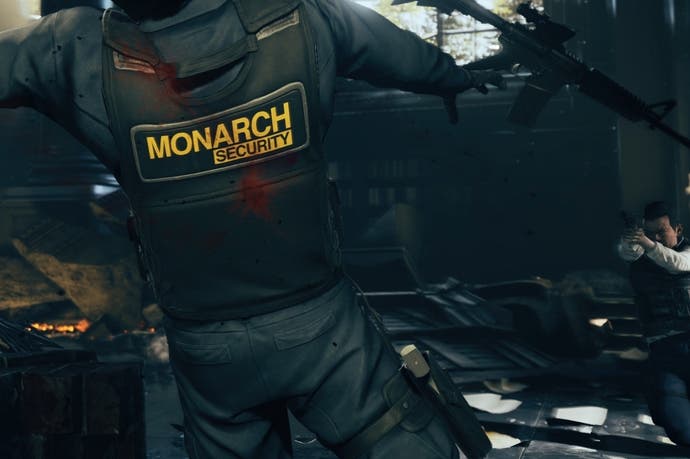Xbox One shows flickers of visionary promise but misses an opportunity to prove it with games
Some thoughts from Redmond.
"Simple, instant and complete."
Microsoft's initial slogan for Xbox One - repeated a couple of times at the front of the 60-minute press conference - doesn't sound like it has much to do with video games at all, really. In my notes it says this next to it: "Hmm."
After all the snap mode stuff, Smartglass, Skype, Kinect, NFL and the rest of the bluster died down, however - in fact, after the press conference ended and as I sat in a lower-key developer panel chaired by Larry Hryb - I realised that those words weren't really the theme of what I was experiencing, and another one began to establish itself through the steady rhythm of repetition.
This one spoke to me in a way I really didn't expect. It said that Xbox One games would be better-looking than we have now (obviously) but that they would also be different, because Xbox One games will be able to perform computations in the cloud, draw upon Kinect's natural interfaces in every owner's home rather than just some of them, and bring to bear multiple devices.
Having complained at the PlayStation 4 launch in New York in February that Sony's presentation was too humble and reactive, it was a pleasant surprise to be sat listening to smart Xbox engineers define a vision for the future of games and for it to be, well, an actual vision of some sort, rather than mere amplification. Computation in the cloud, natural interfaces and multiple devices: tools that will empower developers in ways they either haven't had or haven't been able to rely on in the past. I'll take that for now.
Within a couple of hours, as I was being walked through a series of Kinect 2.0 tech demos, there were already green shoots of originality sprouting from beneath the bluster and stage management. For example, what if the heart-rate monitoring function was harnessed to dynamically adjust the pace and scale of battles in Gears of War? Or to judge when to be suspenseful and when to be shocking in a horror game? I am in a hotel that is exactly one door down from the building where Valve is based - I find myself thinking back to Gabe Newell's suggestion that games should detect our feelings.

As for 15 exclusive games in the first year, my first thought was that it's extremely sad that we now live in a world where the fact that eight of them won't be sequels (!!!111) is paraded around like a medal. But Phil Harrison was good at nurturing interesting ideas at Sony - the London studio harshly dismantled in his absence was never short of inspiration - and, if they all resonate with the same spectre of potential as Remedy's briefly seen Quantum Break, then E3 in a few weeks' time should be an interesting show.
As for the rest of Xbox One, though - I will still need a lot of convincing. And I ended up with my own mantra: prove it with games!
OK, there's a vision of sorts for how games can be different, better and stronger, but one of the things that grows ever more wearying with each passing press conference I attend - whether it's Sony, Microsoft or whoever - is the suffocating repetition of the same time-worn language of video game hype. Emotion, immersion, depth, fidelity. A close-up of a man's face. Can we stop looking at a close-up of a man's face? Please? I know what frown lines look like on a man's face - I gain about a dozen of them every time I hear phrases like "stop just watching and start feeling alive".
Bring me some magic. That first time I walked into Computer Exchange in Harrow and saw an import copy of Super Mario 64 and just gasped; that intense sensation that holds you somewhere between the desire to play more and the equally powerful urge to stop so you can tell your friends what you are experiencing: that shouldn't be lightning in a bottle. Flick back through the generation we're still experiencing and I had it the first time I met someone in Journey, or when Peter Molyneux showed me Milo & Kate. It isn't anethema to triple-A, either - the first time Jade Raymond demonstrated Assassin's Creed was exactly the same. "I don't know what that is," she deadpanned as Animus code bled mysteriously at the edge of the screen.
Nobody needs to be told that games will "blur the line between real and virtual". Your soundbites will expand to fill the void of my ambivalence and dispassion. Find parts of your games that carry that promise implicitly with minimal intervention and let them prove it to me.

There is also less evidence than ever that Microsoft sees the rise of indie gaming as relevant to its interests. Xbox Live Arcade and the Indie Games channels will be gone from the Xbox One dashboard, replaced by a blend of curation and meritocracy that Phil Harrison claims will be enough to help the best of them still rise to the top, a claim anyone who has seen the way Microsoft likes to program the existing Xbox dashboard panels will find highly dubious.
While Sony continues to invest in oddball concepts and indie games - even inviting Jonathan Blow to show off The Witness at the launch of PS4 - and Kickstarter and Steam Greenlight dominate the headlines on gaming sites the world over, Microsoft seems to have left the real grass roots behind. Even the Xbox Reveal tent was resting on astroturf. Xbox One's unveiling was crying out for a sliver of proof that the legacy of games like Castle Crashers, Limbo, Super Meat Boy and Braid hasn't been utterly, utterly forgotten.
Elsewhere, Phil Harrison, who was relentlessly accommodating, patient and friendly throughout the hour or so I ended up spending with him over two interviews, did his best to clear up Xbox One's attitude to game ownership, second-hand sales and internet requirements, but as much as Microsoft wants us to feel that it's all about enhancing our games, it still feels like a step in an uncomfortable direction for consoles. Not that the idea of buying a game you can't lend to other people is unusual these days - that's every PC game at the moment, basically - but if the transition must be upon us for console then we could do with seeing some games that convincingly justify this change.
And while it may unlock potential that has been beyond developers up to now, I also don't feel wholly comfortable with this idea of games relying on the cloud to carry some of the computational burden, at least not in certain cases.

When I decide to buy a game with multiplayer features built on dedicated servers nowadays, for example, I know that this will not be a permanent element of the game but - and perhaps this is unique to me - I don't care as much about preserving that competitive experience for 20 years down the line as I would about preserving a single-player story-driven experience. The implication seems to be that cloud computation will start to pervade that side of gaming as well now and, in the absence of positive proof of its value, it makes me worry about the future of the art developers create.
Think about it this way. The greatest films and pieces of music can be reissued generation after generation at limited expense when new formats emerge. But games are younger and more delicate, already programmed and shaped to suit a particular platform's internal components and input devices in a way that may present a significant technical and financial challenge to any future generation that hopes to resurrect them. This is especially relevant in the case of any work that does not find a significant commercial audience when it's first completed - when this happens with music and film, a song or movie may be rescued forever through digitisation, but even small games may require significant time and expert adaptation if they are to be saved for posterity.
It's entirely possible - as with Super Nintendo games emulated for PC and Android by an enthusiastic minority, or re-released for pennies on Nintendo's own Virtual Console - that the rate of technological progress, the skill of amateurs, and the careful maintenance of back catalogues by companies like Nintendo will continue to guard against our greatest treasures disappearing forever in generations to come. But what do we do in 25 or 50 years' time when a single-player Xbox One RPG that needs to talk to the cloud to compute some of its features can no longer do so because Microsoft has moved on? Do those amateurs and developer-historians then have to recreate the cloud as well? It won't happen. Microsoft could be loading up the greatest artists in the history of games with the digital equivalent of self-destructing paint.
And so I say again: prove it with games.
For me, the story of Xbox One's first day as a tangible reality was that I like some of the theory, but Microsoft missed an opportunity to let the games really sell the ideas. Hopefully they and Sony will find their range when we get to grips with their software line-ups at E3.
This article is based on a press trip to Microsoft's campus in Redmond, Washington. Microsoft paid for travel and accommodation.

